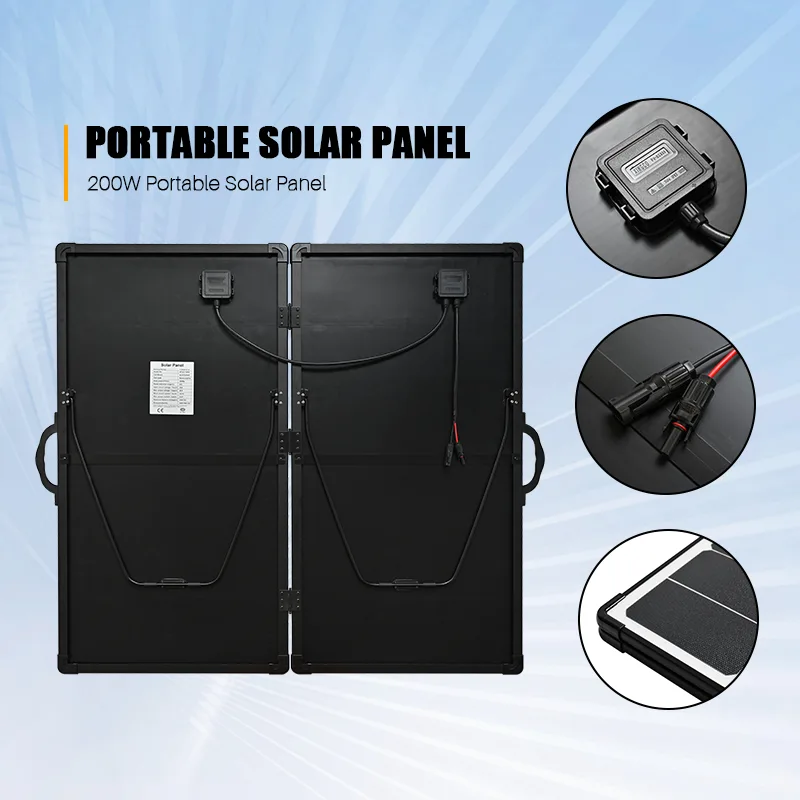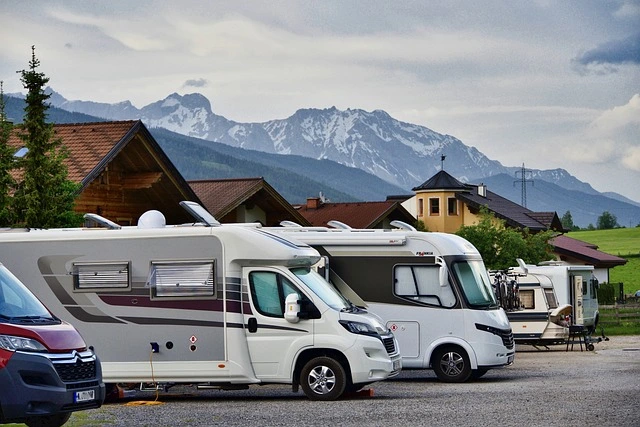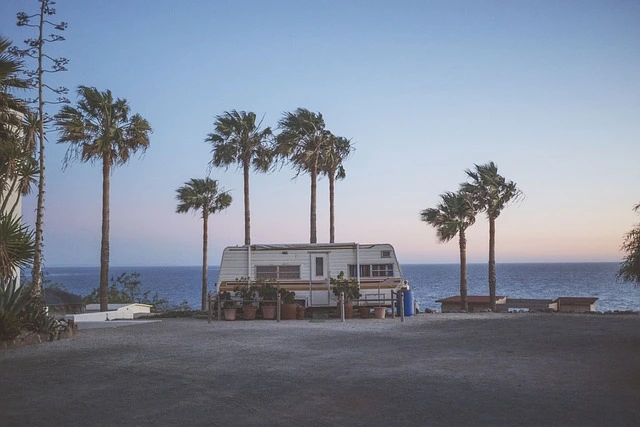When installing solar kits for RV, there are two main options: portable and fixed solar kits. Both types of solar panels have their benefits and considerations, so you need to consider your requirements and preferences when choosing the ideal RV solar kit.
What are Solar Kits for RV and How Does It Work?
An RV solar kit is like a portable power station for your camper. It works by using special panels to catch sunlight and turn it into electricity. This electricity then runs the various gadgets and appliances in your RV. Unlike the big solar setups on houses, RV solar panels are easy to set up and take down, plus they can bend to fit on your RV’s roof.
Here’s the key point: RV solar panels are smaller and can handle powering a few big things in your RV, like kitchen appliances or a bunch of small devices. It’s not meant to power an entire house like those big solar setups.
Think of it like your car’s gas tank. The battery in your RV is like your car’s tank, and it’s usually rated at 100 amp-hours, which is like gallons of gas. This power is used to run things like your fridge, water pump, or TV in your RV. Once the battery is used up, the solar panels kick in to recharge it, just like filling up your gas tank. Easy, right?
Solar Kits for RVs are major components installed on a camper or RV to provide solar power. These kits are usually categorized into three types:
Basic Solar Panel Kits
These kits usually include the following main components:
- RV solar panels: panels used to capture solar energy and convert it into electricity.
- Solar Charge Controller: A device used to manage charging and protect the battery from overcharging.
- Mounting brackets: brackets or support structures used to mount the solar panels on the RV.
- Wires and fuses: used to connect the solar panel to the battery and other electrical components and provide circuit protection.
Basic kits provide you with the foundation to begin building your solar electrical system, but you may need additional accessories and components, such as batteries and inverters, to complete the entire system.
Complete Solar Panel Kit
This type of kit includes batteries and an inverter, which means you already have all the major components you need to build a solar system. While there may be a few minor spare parts needed, you are ready to start installing the major parts of your system.
Plug and Play System
This is a stand-alone solar power station that you can easily place in the back of your vehicle without complicated installation. You can use a plug-and-play system in the following ways:
- Portable solar panels: these panels can be set up at any time to capture solar energy while camping.
- Roof-mounted solar panels: These panels are usually mounted on the vehicle’s roof to capture solar energy while traveling.
- DC Plugs: You can charge your devices from a DC outlet while traveling.
- Wall AC Outlet: You can charge your device via an AC outlet on the wall while you are parked and resting.
Solar power kits come in a variety of sizes and power levels, so you can choose the right one for your electricity needs and budget. If you only need to power a few lights and charging devices, a smaller system may be sufficient. But to run ventilation fans, portable refrigerators, and other larger appliances, you’ll need to consider a larger solar panel kit (which also comes with a higher cost).

Portable Vs. Fixed: Which Is the Best Solar Panel Kit for RV
| Feature/Comparison Factor | Portable Solar kits for RV | Fixed Roof Solar Kits for RV |
| Durability | Lower | Higher |
| Lifespan | Shorter | Longer |
| Ease of Installation | High |
High |
| Initial Cost | Low |
High |
| Flexibility | High |
Low |
| Storage Space Required | High | Low |
| Setup Required for Each Stop | Yes |
No |
| No Alteration to Vehicle Structure | Yes |
No |
We list the key differences between portable and fixed-roof solar systems, which will assist you in making an informed decision when selecting the solar energy solution that best fits your needs. Next, let’s explore deeper into the features and benefits of these two complete solar kit for RV.
What Solar Panel for RV Is Best?
Choosing between portable and fixed solar kits for RV (or even hybrid solutions) requires some homework. Factors to consider include your current and future power needs, and of course, your budget. However, the first step is understanding your camping style and locations:
Weekend Campers: For weekend campers who only need solar power for a few days at a time, portable systems should suffice. While portable systems may not match the performance of fixed solutions, they should meet the needs of RV campers who only require solar power for short trips.
Full-Timers: Full-time RV travelers who frequently overnight in parking lots or rest areas often opt for fixed solar solutions to ensure a constant power supply. However, if they venture into remote areas and have lower power demands, portable systems can be a backup option.
Power Users: RV users looking for the convenience of home amenities may need to choose a robust roof-mounted solar system. Even the best portable systems may struggle to meet the power demands of these campers. However, these RVs can use smaller roof systems supplemented with portable panels to boost charging when needed.
Understanding your camping style and power requirements will guide you in making the right choice between portable and fixed RV solar systems. Each option has its strengths and limitations, so matching the system to your specific needs will ensure a satisfying and sustainable RV experience.
Choosing the right type of solar panel depends on your needs and preferences.
- If you are more concerned with portability, flexibility, and lower installation costs, a portable solar system may be better for you.
- However, a fixed rooftop solar system may be more appropriate if you are more concerned with convenience, stability, and long-term use.
Before making a decision, it’s also important to consider your budget and power needs to ensure you’ve chosen the most appropriate solar solution to meet your energy needs while traveling in your RV.
Regardless of your type, solar panels can provide you with clean, renewable energy that you can enjoy comfortably away from the grid. This renewable energy option helps to reduce dependence on traditional energy sources and minimize your carbon footprint while providing you with a self-sufficient energy supply that allows you to better explore the world’s landscapes.
Pros of Portable Solar Kits for RV
Optimized for size and weight: Portable solar kits for RVs are usually designed to be lightweight and easy to carry. Instead of being mounted on the RV roof, they can be stored inside the RV and only need to be deployed when parked. This lightweight design makes it easier to move around without adding extra wind resistance or weight, helping to maintain the fuel efficiency of the RV.
Flexibility: Portable solar systems offer users great flexibility. You can place the solar panels in the optimal sunlight exposure location to maximize energy collection efficiency. This feature is perfect for those who like to change parking locations frequently. There is no need to park your RV in a specific location, simply place the solar panels in the sun.
No Installation and Wiring Required: Compared to stationary systems, portable solar systems do not require complicated installation or internal wiring. This means you don’t have to worry about drilling holes or making complicated wire connections, which saves time and work. This also reduces the need to modify the structure of your RV, maintaining its original look and value.
Potential Savings: While portable solar systems may be more expensive on their own, the overall cost may be cheaper considering that they do not require professional installation. In addition, their flexibility and portability can pay you more in the long run. You can gradually expand your system as you need it without having to invest a large amount of money all at once.
Pros of Fixed Solar Kits For RV Rooftop
Simplified setup: For those who don’t want to install and remove solar panels every time they park their car, a fixed-roof solution may be more convenient. These systems are permanently mounted on the roof of the RV, so there is no need to repeat the setup. Simply park, turn on the solar panels, and you’re ready to start charging.
Reduced Space Requirements: Where space is limited in an RV or travel trailer, fixed panels don’t require additional storage space because they are fixed to the roof. This means you don’t have to worry about storage, especially as electricity demand grows. Space inside an RV is often at a premium, so there is no need to consider the challenge of additional storage.
Stability: Stationary panels are usually stronger and less susceptible to wind, rain, or other weather conditions. This ensures a long-lasting and stable system that doesn’t need to worry about damage while on the move. This stability is especially important because damage to solar panels can result in decreased performance or the need for repairs.
Key Factors in Choosing An RV Solar Panel Kit
Solar Panel Types
Monocrystalline solar panels are usually more efficient and are especially suited to limited installation space. Polycrystalline silicon is also an option but may be slightly less efficient. Thin-film solar panels are lighter but less efficient. Or you can search by their characteristics. portable solar panels are generally suitable for outdoor carrying, simple to use, and easy to install. flexible solar panels can usually be bent to a certain curvature and are also lighter, making them suitable for mounting on uneven flat surfaces such as the roofs of RVs or trailers. rigid solar panels are usually mounted to the roof of a house as a part of a stationary solar system. Rigid solar panels are usually mounted on the roof as a component of a fixed solar system, and the glass panels are stronger and more stable. Consider the pros and cons of flexible solar panels vs rigid solar panels before making your choice.
Charge controllers
It is best to choose charge controllers with MPPT (Maximum Power Point Tracking) technology, as they capture solar energy more efficiently and convert it into electricity.MPPT controllers can improve efficiency, especially in varying weather conditions.
Battery Type
Choosing the best battery for your RV is an important consideration. Lithium iron phosphate (LiFePO4) batteries are often considered a better choice because they have a long lifespan, are efficient at charging and discharging, and are relatively lightweight. AGM (Absorbed Glass Fiber) batteries are also a common choice, but they may not last as long as LiFePO4 batteries and require more frequent maintenance.
Inverter type
If you need to convert solar power to AC to run standard household appliances, choosing a pure sine wave inverter is a good idea. Pure sine wave output is more suitable for many electronic devices than modified sine wave inverters.
Kit size and power
Choose a kit that is large enough to meet your electrical needs. Typically, a 200-watt solar panel kit is the minimum requirement. Still, for higher power needs, such as large refrigerators, air conditioners, etc., you may need a larger kit, or even consider multiple solar panels working collaboratively to increase capacity.
Brand and Quality
Choose a solar panel kit from a reputable brand to ensure quality and reliability. Good brands usually offer better warranties and customer support services. Sungold Solar is the best off-grid solar system manufacturer.
Installation and Maintenance
Ensure that you are knowledgeable or can hire a professional for installation and maintenance. Solar systems require regular maintenance, including cleaning the surface of the solar panels and checking the wires and connections to ensure proper functioning of the system.
Ultimately, when choosing an RV solar panel kit, you need to consider your specific needs, budget, and usage to ensure that your system will be able to meet your electrical energy needs.
Best Solar Panels for RV
Although, in my previous section, I compared the pros and cons of both fixed-mounted solar panels and portable solar panels for RVs, since RVs are often on the move and you can’t always find the nearest RV park on the road, I would recommend that you go with the portable solar panels for RVs for the sake of flexibility.
I think the best solar panel for RV is the HP-S 200W from Sungold Solar.
- Efficient Energy Conversion: Utilizing Sunpower solar cells, boasts a power conversion efficiency of up to 24.40%.
- Unique Exterior Design: With a distinctive exterior design that showcases quality.
- Waterproof and Dustproof: Rated IP68 for waterproof and dustproof capabilities, ensuring adaptability to various environments.
- Portable Connectivity: Equipped with MC4 connectors and a 3-meter cable, allowing easy connection to different types of batteries or portable power stations.
- Flexible Mobility Solution: Providing an ideal solar power solution for flexible mobile systems like RVs.
- Flexible and Efficient: Offering a flexible and efficient solar power solution, meeting your energy needs anytime, anywhere.

RVs, as homes on wheels, need energy solutions that are easy to take along. This solar panel is super light and portable, so you can juice up your RV wherever you roam, no need to stress about being far from an outlet. And since RVs are usually tight on space, this panel’s sleek design saves room without hogging up storage or moving space. Whether you’re cruising or parked, RVs always crave power. This solar panel rocks with high energy conversion and steady performance, ensuring your RV stays powered up non-stop, come rain or shine.
Trust Me, HP-S-2x100W are the best solar panels for RV that I have ever seen!
RV Solar Panels FAQs
Is it Worth Getting Solar Kits for an RV?
The value depends on your priorities. While battery power is convenient, it may cost more in the long run. Solar energy is efficient in sunny areas and can be a great addition to your RV for power production, serving as a primary or backup source.
How Many Solar Panels for a Travel Trailer?
The number depends on your power needs. A general rule is that a 100-watt solar panel produces 30-amp hours per day. Assess your usage and purchase panels accordingly, often combining solar and battery power for camping needs.
How many watts of solar do I need for my RV?
The amount of solar power you need for your RV depends on your power needs and preferences. Generally speaking, most RVs require between 100 to 500 watts of solar power depending on what you need powered .
Is 200 watt solar enough for RV?
Yes, 200 watts of solar power is enough for an RV. It can power a 12V refrigerator and other small devices for a few hours. However, if you want to power more devices or live in your RV for most of the year, you may need more solar power.
How many solar panels do I need to run everything in my RV?
The exact number of solar panels you need to run everything in your RV depends on your RV’s power needs and preferences. Generally speaking, most RVs require between two and four solar panels. A basic 100 watt or 200 watt RV system would typically include two 100 watt solar panels.
How to hook up solar panels to RV Batteries?
- Mount panels for optimal sunlight exposure.
- Connect the charge controller to the 12V battery cable.
- Verify the charge controller.
- Use a mec4 connector to link the panel to the controller.
- Solar panels convert DC electricity; an inverter enables charging or running devices in AC.
What can a 400-watt solar panel run in an RV?
What can a 400 watt solar panel run? A 400-watt solar panel can produce 2 kWh of energy in 5 hours. So it can run fans, laptop chargers, TVs, or LED light bulbs.















